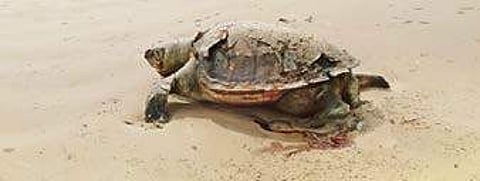

VIJAYAWADA: Even as the nesting season of the endangered Olive Ridley sea turtles is underway, the death of the turtles along the sea coast of the State continues unabated. Carcasses of three adult Olive Ridley turtles were found on Suryalanka beach near Bapatla in Guntur district recently. “The three turtles bled to death after getting entangled in the synthetic nets and getting hit by fishing boats. We see these turtles die in large numbers every year,” said P Nagendramma, who runs a food joint on the Suryalanka beach.
The Olive Ridleys are facing the threat of extinction and classified as ‘vulnerable’ by the International Union for Conservation of Nature and Natural Resources (IUCN). Though the Forest Department has been taking up various activities to protect the turtles, the results are far from desirable. Death of Olive Ridley sea turtles is rampant along the coast of Andhra Pradesh, which has a long coastline of 974 kms. Animal activist Pradeep Kumar Nath of the Visakhapatnam Society for Protection and Care of Animals (VSPCA), which has been leading a sea turtle protection programme since 1996, said that a whopping 4,000 Olive Ridleys died every year due to similar reasons.
“The sea turtles come to the shore for nesting between October and May. Based on the current trend, which is alarming, we estimate that close to 4,000 turtles are getting killed every year along the State coasts due to fishing activity and other predators,” he observed.
He said that given the number of turtles reaching the shore for nesting, the number of deaths was expected to increase drastically in the next few years. To contain rampant death of turtles, the State government should strictly implement preventive measures like seizing the fishers’ equipment that led to the deaths, Pradeep demanded.
“Our government should emulate Odisha which has taken sea turtle conservation very seriously. A special committee should be formed by the State government to draft policies for the same.
“In fact, the government should stop organising festivals on beaches and also ban fishing during the nesting season,” he suggested.
The VSPCA said that Andhra Pradesh -- especially the North Coastal districts -- can be made a breeding ground for the Olive Ridleys as they are migrating to the State in large numbers from Odisha. “As the beaches are shrinking there, our government should seize the opportunity and take up immediate measures,” Pradeep Kumar Nath added.
The Forest Department, on its part, maintained that it has taken up initiatives such as establishment of hatcheries, creating awareness among the fishing community and release of hatchlings into the sea.
In troubled waters
Authority to spend J1.18 crore this year to conserve the endangered species
The Olive Ridleys, a scheduled-I species under Wildlife (Protection)Act, 1972, are declared ‘vulnerable’ by IUCN
Independent studies show that a whopping 4,000 sea turtles died along the coastline of the state every year between October and May
Carcasses of Olive Ridleys washing ashore is a common sight in Visakhapatnam, Machilipatnam, Bapatla, Kakinada and other beaches
Animal activists urge the government to constitute a committee
Activists say that once the habitat of nesting is damaged, it can’t be repaired
The number of hatchlings released into the sea increased from 1.9 lakh in 2015-16 to 4.8 lakh in 2016-17
However, the rate of survival of the hatchlings is less than 10 percent only
The State forest department to setup 67 hatcheries across the state this nesting season
About 234 protection watchers to be engaged to safeguard the turtles during the nesting season
Department to spent J1.18 cr to conserve the endangered species this year
If injured turtles are found on seashores, temporary facilities will be set up with the help of NGOs to treat them